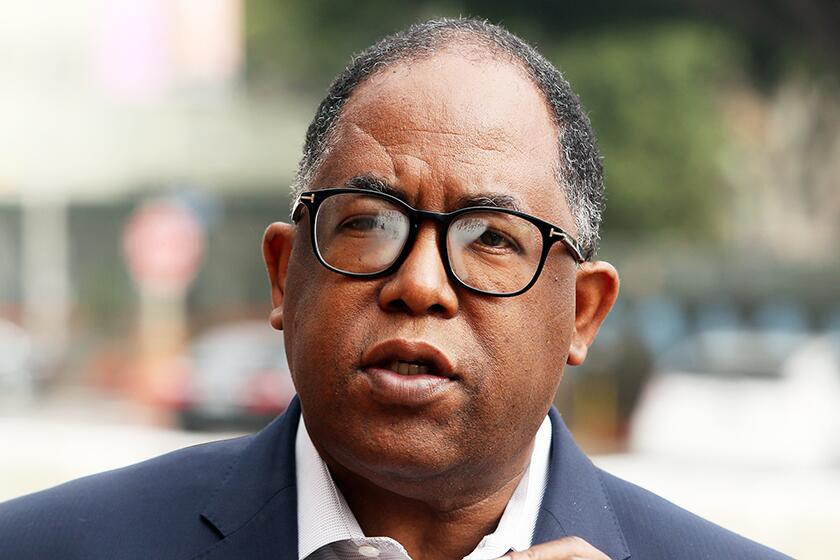California redistricting commissioner misses key meetings
SACRAMENTO — On the day California’s independent redistricting commission approved and released to the public long-awaited draft political maps, one of the panel’s 14 members was missing for the bulk of the key meeting.
Commissioners spent seven hours on Nov. 10 reworking draft legislative, congressional and board of equalization lines that, once finalized, will be used for the next decade. Antonio Le Mons, a No Party Preference commissioner from Studio City who now has a Rancho Mirage address, logged on late and didn’t participate in the process, video recordings and transcripts show. But before voting to approve the draft lines, he congratulated his fellow commissioners for the accomplishment.
“I’m very proud to have been a part of this process with my fellow commissioners,” he said. “This has been quite a journey in the heart of a pandemic, and I think we should all feel very good.”
This wasn’t the first time Le Mons logged on late or missed a meeting before important deadlines. The commission has marked Le Mons absent for roll call in 16 of 44 hearings since October, as members met for marathon line-drawing sessions. Commissioners have until Dec. 27 to send certified maps to Secretary of State Shirley Weber before they’re used in 2022 statewide elections.
Sometimes, as happened on Nov. 10, Le Mons was marked absent during roll call before arriving late. The commission, according to spokesperson Fredy Ceja, records attendance only to establish a quorum at the start of a meeting.
The nonpartisan panel comprises five Republicans, five Democrats and four No Party Preference voters selected during a lengthy process that began in 2019. Commissioners are charged with drawing lines using census data that “provide fair representation for all Californians” under ballot measures voters approved in 2008 and 2010 to strip the Legislature of redistricting power.
Le Mons’ commissioner profile outlines 25 years of nonprofit and private sector leadership. He’s listed as the chief operating officer of the Skid Row Housing Trust, a Los Angeles-based organization that helps homeless, disabled and poor people, along with those struggling with drug addictions, to find permanent shelter. Le Mons is also, according to his commissioner biography, a former member of the California Assn. of Marriage and Family Therapists. He now runs a personal coaching and consulting firm.
He is also a co-star on streaming channel Fox Soul’s “The House,” a show that premiered Oct. 8 and focuses on Black LGBTQ issues. It’s unclear when filming began or if it coincided with commission responsibilities.
Most commissioners have missed a meeting, and some more than one, though it’s difficult to determine how many under the commission’s record-keeping system. Certain members also participate more than others, and many turn off their cameras during meetings. Republican commissioner Derric Taylor was marked absent for nearly as many meetings — 14 — as Le Mons over the last few months. Ceja said Taylor started a new assignment with additional responsibilities in his role at the Los Angeles County Sheriff’s Department. Ceja said he did not know why Le Mons had missed meetings.
Ceja said the commission does not have an attendance requirement, but “the expectation is that commissioners attend as many meetings as possible, recognizing that many still have full-time jobs outside of their volunteer commission duties.” Members are paid $378 per day when performing commission-related work. Ceja said the pay is not contingent on a number of hours worked or meetings attended, but is earned “for each day the member is engaged in commission business.”
Le Mons participated during meetings while serving as rotating chair in early November. Now, he more often attends meetings in silence and rarely appears on camera.
Le Mons did not respond to interview requests from The Times.
“It’s unfortunate because he was selected through an amazing process trying to get people who have diversity — regional, experiential, ethnic, LGBTQ. All these things were valuable aspects to his application,” said Paul Mitchell, a political data consultant and redistricting expert. “If he wasn’t going to be fully committed, he should not have applied or continued in the process because there might have been other applicants who represent the communities he represents and been more engaged.”
Le Mons’ absence, Mitchell added, has “become somewhat of a meme on Twitter.”
Le Mons’ lack of participation also raises concerns among those watching the process that he will soon vote on maps that he doesn’t know. At least nine members, three from each party, must approve the final maps.
Matt Rexroad, a Republican political consultant, compared Le Mons voting on the final maps to a local elected official missing hearings and public testimony and then voting on a city general plan.
“Or even if you were a judge,” Rexroad added, “but did not bother to show up for the trial before making a ruling.”
Ceja said the commission is likely to have a unanimous vote to approve the final drawings.
“We have complete and utter confidence that all commissioners will execute their duty to create fair and equitable maps for the people of California,” Ceja said.
More to Read
Sign up for Essential California
The most important California stories and recommendations in your inbox every morning.
You may occasionally receive promotional content from the Los Angeles Times.











